قرعه شانس
- توضیحات
-
منتشر شده در دوشنبه, 30 -3443 03:25
-
نوشته شده توسط محمد رضا بیوکه
-
بازدید: 991

The Lottery
by Shirley Jackson(1948)
The morning of June 27th was clear and sunny, with the fresh warmth of a full-summer day; the flowers
were blossoming profusely and the grass was richly green. The people of the village began to gather in
the square, between the post office and the bank, around ten o'clock; in some towns there were so many
people that the lottery took two days and had to be started on June 2th. but in this village, where there
were only about three hundred people, the whole lottery took less than two hours, so it could begin at ten
o'clock in the morning and still be through in time to allow the villagers to get home for noon dinner.
The children assembled first, of course. School was recently over for the summer, and the feeling of
liberty sat uneasily on most of them; they tended to gather together quietly for a while before they broke
into boisterous play. and their talk was still of the classroom and the teacher, of books and reprimands.
Bobby Martin had already stuffed his pockets full of stones, and the other boys soon followed his
example, selecting the smoothest and roundest stones; Bobby and Harry Jones and Dickie Delacroix-- the
villagers pronounced this name "Dellacroy"--eventually made a great pile of stones in one corner of the
square and guarded it against the raids of the other boys. The girls stood aside, talking among themselves,
looking over their shoulders at rolled in the dust or clung to the hands of their older brothers or sisters.
Soon the men began to gather. surveying their own children, speaking of planting and rain, tractors and
taxes. They stood together, away from the pile of stones in the corner, and their jokes were quiet and they
smiled rather than laughed. The women, wearing faded house dresses and sweaters, came shortly after
their menfolk. They greeted one another and exchanged bits of gossip as they went to join their husbands.
Soon the women, standing by their husbands, began to call to their children, and the children came
reluctantly, having to be called four or five times. Bobby Martin ducked under his mother's grasping hand
and ran, laughing, back to the pile of stones. His father spoke up sharply, and Bobby came quickly and
took his place between his father and his oldest brother.
The lottery was conducted--as were the square dances, the teen club, the Halloween program--by Mr.
Summers. who had time and energy to devote to civic activities. He was a round-faced, jovial man and he
ran the coal business, and people were sorry for him. because he had no children and his wife was a
scold. When he arrived in the square, carrying the black wooden box, there was a murmur of
conversation among the villagers, and he waved and called. "Little late today, folks." The postmaster, Mr.
Graves, followed him, carrying a three- legged stool, and the stool was put in the center of the square and
Mr. Summers set the black box down on it. The villagers kept their distance, leaving a space between
themselves and the stool. and when Mr. Summers said, "Some of you fellows want to give me a hand?"
there was a hesitation before two men. Mr. Martin and his oldest son, Baxter. came forward to hold the
box steady on the stool while Mr. Summers stirred up the papers inside it.
The original paraphernalia for the lottery had been lost long ago, and the black box now resting on the
stool had been put into use even before Old Man Warner, the oldest man in town, was born. Mr.
Summers spoke frequently to the villagers about making a new box, but no one liked to upset even as
much tradition as was represented by the black box. There was a story that the present box had been
made with some pieces of the box that had preceded it, the one that had been constructed when the first
people settled down to make a village here. Every year, after the lottery, Mr. Summers began talking
again about a new box, but every year the subject was allowed to fade off without anything's being done.
The black box grew shabbier each year: by now it was no longer completely black but splintered badly
along one side to show the original wood color, and in some places faded or stained.
Mr. Martin and his oldest son, Baxter, held the black box securely on the stool until Mr. Summers had
stirred the papers thoroughly with his hand. Because so much of the ritual had been forgotten or
discarded, Mr. Summers had been successful in having slips of paper substituted for the chips of wood
that had been used for generations. Chips of wood, Mr. Summers had argued. had been all very well
when the village was tiny, but now that the population was more than three hundred and likely to keep on
growing, it was necessary to use something that would fit more easily into he black box. The night before
the lottery, Mr. Summers and Mr. Graves made up the slips of paper and put them in the box, and it was
then taken to the safe of Mr. Summers' coal company and locked up until Mr. Summers was ready to take
it to the square next morning. The rest of the year, the box was put way, sometimes one place, sometimes
another; it had spent one year in Mr. Graves's barn and another year underfoot in the post office. and
sometimes it was set on a shelf in the Martin grocery and left there.
There was a great deal of fussing to be done before Mr. Summers declared the lottery open. There were
the lists to make up--of heads of families. heads of households in each family. members of each
household in each family. There was the proper swearing-in of Mr. Summers by the postmaster, as the
official of the lottery; at one time, some people remembered, there had been a recital of some sort,
performed by the official of the lottery, a perfunctory. tuneless chant that had been rattled off duly each
year; some people believed that the official of the lottery used to stand just so when he said or sang it,
others believed that he was supposed to walk among the people, but years and years ago this p3rt of the
ritual had been allowed to lapse. There had been, also, a ritual salute, which the official of the lottery had
had to use in addressing each person who came up to draw from the box, but this also had changed with
time, until now it was felt necessary only for the official to speak to each person approaching. Mr.
Summers was very good at all this; in his clean white shirt and blue jeans. with one hand resting
carelessly on the black box. he seemed very proper and important as he talked interminably to Mr. Graves
and the Martins.
Just as Mr. Summers finally left off talking and turned to the assembled villagers, Mrs. Hutchinson came
hurriedly along the path to the square, her sweater thrown over her shoulders, and slid into place in the
back of the crowd. "Clean forgot what day it was," she said to Mrs. Delacroix, who stood next to her, and
they both laughed softly. "Thought my old man was out back stacking wood," Mrs. Hutchinson went on.
"and then I looked out the window and the kids was gone, and then I remembered it was the twenty-
seventh and came a-running." She dried her hands on her apron, and Mrs. Delacroix said, "You're in time,
though. They're still talking away up there."
Mrs. Hutchinson craned her neck to see through the crowd and found her husband and children standing
near the front. She tapped Mrs. Delacroix on the arm as a farewell and began to make her way through
the crowd. The people separated good-humoredly to let her through: two or three people said. in voices
just loud enough to be heard across the crowd, "Here comes your, Missus, Hutchinson," and "Bill, she
made it after all." Mrs. Hutchinson reached her husband, and Mr. Summers, who had been waiting, said
cheerfully. "Thought we were going to have to get on without you, Tessie." Mrs. Hutchinson said.
grinning, "Wouldn't have me leave m'dishes in the sink, now, would you. Joe?," and soft laughter ran
through the crowd as the people stirred back into position after Mrs. Hutchinson's arrival.
"Well, now." Mr. Summers said soberly, "guess we better get started, get this over with, so's we can go
back to work. Anybody ain't here?"
"Dunbar." several people said. "Dunbar. Dunbar."
Mr. Summers consulted his list. "Clyde Dunbar." he said. "That's right. He's broke his leg, hasn't he?
Who's drawing for him?"
"Me. I guess," a woman said. and Mr. Summers turned to look at her. "Wife draws for her husband." Mr.
Summers said. "Don't you have a grown boy to do it for you, Janey?" Although Mr. Summers and
everyone else in the village knew the answer perfectly well, it was the business of the official of the
lottery to ask such questions formally. Mr. Summers waited with an expression of polite interest while
Mrs. Dunbar answered.
"Horace's not but sixteen vet." Mrs. Dunbar said regretfully. "Guess I gotta fill in for the old man this
year."
"Right." Sr. Summers said. He made a note on the list he was holding. Then he asked, "Watson boy
drawing this year?"
A tall boy in the crowd raised his hand. "Here," he said. "I'm drawing for my mother and me." He blinked
his eyes nervously and ducked his head as several voices in the crowd said thin#s like "Good fellow,
lack." and "Glad to see your mother's got a man to do it."
"Well," Mr. Summers said, "guess that's everyone. Old Man Warner make it?"
"Here," a voice said. and Mr. Summers nodded.
A sudden hush fell on the crowd as Mr. Summers cleared his throat and looked at the list. "All ready?" he
called. "Now, I'll read the names--heads of families first--and the men come up and take a paper out of
the box. Keep the paper folded in your hand without looking at it until everyone has had a turn.
Everything clear?"
The people had done it so many times that they only half listened to the directions: most of them were
quiet. wetting their lips. not looking around. Then Mr. Summers raised one hand high and said, "Adams."
A man disengaged himself from the crowd and came forward. "Hi. Steve." Mr. Summers said. and Mr.
Adams said. "Hi. Joe." They grinned at one another humorlessly and nervously. Then Mr. Adams reached
into the black box and took out a folded paper. He held it firmly by one corner as he turned and went
hastily back to his place in the crowd. where he stood a little apart from his family. not looking down at
his hand.
"Allen." Mr. Summers said. "Anderson.... Bentham."
"Seems like there's no time at all between lotteries any more." Mrs. Delacroix said to Mrs. Graves in the
back row.
"Seems like we got through with the last one only last week."
"Time sure goes fast.-- Mrs. Graves said.
"Clark.... Delacroix"
"There goes my old man." Mrs. Delacroix said. She held her breath while her husband went forward.
"Dunbar," Mr. Summers said, and Mrs. Dunbar went steadily to the box while one of the women said.
"Go on. Janey," and another said, "There she goes."
"We're next." Mrs. Graves said. She watched while Mr. Graves came around from the side of the box,
greeted Mr. Summers gravely and selected a slip of paper from the box. By now, all through the crowd
there were men holding the small folded papers in their large hand. turning them over and over nervously
Mrs. Dunbar and her two sons stood together, Mrs. Dunbar holding the slip of paper.
"Harburt.... Hutchinson."
"Get up there, Bill," Mrs. Hutchinson said. and the people near her laughed.
"Jones."
"They do say," Mr. Adams said to Old Man Warner, who stood next to him, "that over in the north
village they're talking of giving up the lottery."
Old Man Warner snorted. "Pack of crazy fools," he said. "Listening to the young folks, nothing's good
enough for them. Next thing you know, they'll be wanting to go back to living in caves, nobody work any
more, live hat way for a while. Used to be a saying about 'Lottery in June, corn be heavy soon.' First thing
you know, we'd all be eating stewed chickweed and acorns. There's always been a lottery," he added
petulantly. "Bad enough to see young Joe Summers up there joking with everybody."
"Some places have already quit lotteries." Mrs. Adams said.
"Nothing but trouble in that," Old Man Warner said stoutly. "Pack of young fools."
"Martin." And Bobby Martin watched his father go forward. "Overdyke.... Percy."
"I wish they'd hurry," Mrs. Dunbar said to her older son. "I wish they'd hurry."
"They're almost through," her son said.
"You get ready to run tell Dad," Mrs. Dunbar said.
Mr. Summers called his own name and then stepped forward precisely and selected a slip from the box.
Then he called, "Warner."
"Seventy-seventh year I been in the lottery," Old Man Warner said as he went through the crowd.
"Seventy-seventh time."
"Watson" The tall boy came awkwardly through the crowd. Someone said, "Don't be nervous, Jack," and
Mr. Summers said, "Take your time, son."
"Zanini."
After that, there was a long pause, a breathless pause, until Mr. Summers. holding his slip of paper in the
air, said, "All right, fellows." For a minute, no one moved, and then all the slips of paper were opened.
Suddenly, all the women began to speak at once, saving. "Who is it?," "Who's got it?," "Is it the
Dunbars?," "Is it the Watsons?" Then the voices began to say, "It's Hutchinson. It's Bill," "Bill
Hutchinson's got it."
"Go tell your father," Mrs. Dunbar said to her older son.
People began to look around to see the Hutchinsons. Bill Hutchinson was standing quiet, staring down at
the paper in his hand. Suddenly. Tessie Hutchinson shouted to Mr. Summers. "You didn't give him time
enough to take any paper he wanted. I saw you. It wasn't fair!"
"Be a good sport, Tessie." Mrs. Delacroix called, and Mrs. Graves said, "All of us took the same chance."
"Shut up, Tessie," Bill Hutchinson said.
"Well, everyone," Mr. Summers said, "that was done pretty fast, and now we've got to be hurrying a little
more to get done in time." He consulted his next list. "Bill," he said, "you draw for the Hutchinson
family. You got any other households in the Hutchinsons?"
"There's Don and Eva," Mrs. Hutchinson yelled. "Make them take their chance!"
"Daughters draw with their husbands' families, Tessie," Mr. Summers said gently. "You know that as
well as anyone else."
"It wasn't fair," Tessie said.
"I guess not, Joe." Bill Hutchinson said regretfully. "My daughter draws with her husband's family; that's
only fair. And I've got no other family except the kids."
"Then, as far as drawing for families is concerned, it's you," Mr. Summers said in explanation, "and as far
as drawing for households is concerned, that's you, too. Right?"
"Right," Bill Hutchinson said.
"How many kids, Bill?" Mr. Summers asked formally.
"Three," Bill Hutchinson said.
"There's Bill, Jr., and Nancy, and little Dave. And Tessie and me."
"All right, then," Mr. Summers said. "Harry, you got their tickets back?"
Mr. Graves nodded and held up the slips of paper. "Put them in the box, then," Mr. Summers directed.
"Take Bill's and put it in."
"I think we ought to start over," Mrs. Hutchinson said, as quietly as she could. "I tell you it wasn't fair.
You didn't give him time enough to choose. Everybody saw that."
Mr. Graves had selected the five slips and put them in the box. and he dropped all the papers but those
onto the ground. where the breeze caught them and lifted them off.
"Listen, everybody," Mrs. Hutchinson was saying to the people around her.
"Ready, Bill?" Mr. Summers asked. and Bill Hutchinson, with one quick glance around at his wife and
children. nodded.
"Remember," Mr. Summers said. "take the slips and keep them folded until each person has taken one.
Harry, you help little Dave." Mr. Graves took the hand of the little boy, who came willingly with him up
to the box. "Take a paper out of the box, Davy." Mr. Summers said. Davy put his hand into the box and
laughed. "Take just one paper." Mr. Summers said. "Harry, you hold it for him." Mr. Graves took the
child's hand and removed the folded paper from the tight fist and held it while little Dave stood next to
him and looked up at him wonderingly.
"Nancy next," Mr. Summers said. Nancy was twelve, and her school friends breathed heavily as she went
forward switching her skirt, and took a slip daintily from the box "Bill, Jr.," Mr. Summers said, and Billy,
his face red and his feet overlarge, near knocked the box over as he got a paper out. "Tessie," Mr.
Summers said. She hesitated for a minute, looking around defiantly. and then set her lips and went up to
the box. She snatched a paper out and held it behind her.
"Bill," Mr. Summers said, and Bill Hutchinson reached into the box and felt around, bringing his hand
out at last with the slip of paper in it.
The crowd was quiet. A girl whispered, "I hope it's not Nancy," and the sound of the whisper reached the
edges of the crowd.
"It's not the way it used to be." Old Man Warner said clearly. "People ain't the way they used to be."
"All right," Mr. Summers said. "Open the papers. Harry, you open little Dave's."
Mr. Graves opened the slip of paper and there was a general sigh through the crowd as he held it up and
everyone could see that it was blank. Nancy and Bill. Jr.. opened theirs at the same time. and both
beamed and laughed. turning around to the crowd and holding their slips of paper above their heads.
"Tessie," Mr. Summers said. There was a pause, and then Mr. Summers looked at Bill Hutchinson, and
Bill unfolded his paper and showed it. It was blank.
"It's Tessie," Mr. Summers said, and his voice was hushed. "Show us her paper. Bill."
Bill Hutchinson went over to his wife and forced the slip of paper out of her hand. It had a black spot on
it, the black spot Mr. Summers had made the night before with the heavy pencil in the coal company
office. Bill Hutchinson held it up, and there was a stir in the crowd.
"All right, folks." Mr. Summers said. "Let's finish quickly."
Although the villagers had forgotten the ritual and lost the original black box, they still remembered to
use stones. The pile of stones the boys had made earlier was ready; there were stones on the ground with
the blowing scraps of paper that had come out of the box Delacroix selected a stone so large she had to
pick it up with both hands and turned to Mrs. Dunbar. "Come on," she said. "Hurry up."
Mr. Dunbar had small stones in both hands, and she said. gasping for breath. "I can't run at all. You'll
have to go ahead and I'll catch up with you."
The children had stones already. And someone gave little Davy Hutchinson few pebbles.
Tessie Hutchinson was in the center of a cleared space by now, and she held her hands out desperately as
the villagers moved in on her. "It isn't fair," she said. A stone hit her on the side of the head. Old Man
Warner was saying, "Come on, come on, everyone." Steve Adams was in the front of the crowd of
villagers, with Mrs. Graves beside him.
"It isn't fair, it isn't right," Mrs. Hutchinson screamed, and then they were upon her.
•••••••••••••••••••••••••••••••••
قرعه کشی
آسمان صبح 27 ژوئن صاف و آفتابی بود. با گرمایی تازه از یک روز کاملاً تابستانی. گلها با اشتیاق عمیقی شکوفه میدادند و دشت کاملاً سرسبز شده بود. حوالی ساعت 10 بود که مردم دهکده بتدریج در میدانی که بین اداره پست و بانک قرار داشت گردِ هم آمدند. در بعضی شهرها که جمعیت مردم بسیار زیاد بود، بختآزمایی تقریباً دو روز طول میکشید و از 26 ژوئن شروع میشد. در این شهر که تنها در حدود سیصد نفر سکنه داشت تمام مراسمِ بختآزمایی فقط دو ساعت بطول میانجامید. بنابراین این برنامه در ساعت ده صبح شروع میشد و فقط تا زمانی ادامه مییافت که به روستائیان اجازه میداد برای صرف شام به خانهی خود بروند.
البته بچهها اولین کسانی بودند که دور هم جمع شدند. اخیراً مدرسه بخاطر فرارسیدنِ فصل تابستان تعطیل شده و حسی از رهایی توام با آشفتگی، وجود آنها را فرا گرفته بود. آنها تصمیم گرفتند قبل از اینکه به بازی پر هیاهویی بپردازند، مدت کاملاً کوتاهی گرد هم بیایند. هنوزدرباره کلاس، معلم، کتابها و تنبیهات صحبت میکردند. بابی مارتین تقریباً تمام جیبهایش را پر از سنگ کرده بود و بقیه پسرها نیز با انتخاب صافترین و گردترین سنگها بزودی از عمل او تقلید کردند. بابی، هری و دیکی دلاکروز که روستائیان این اسم را دلاکروی تلفظ میکردند کپه بزرگی از سنگها را در گوشهای از میدان ساختند و برای در امان ماندنش از حمله بقیه پسرها به نگهبانی از آن پرداختند.
دخترها در کناری ایستادند و در حالیکه حرف می زدند، از بالای شانههای یکدیگر پسرها را مینگریستند. بچههای خیلی کوچک نیز در گرد و غبار غلط میزدند و یا محکم به دستان برادرها و خواهرهای بزرگتر از خود میچسبیدند. خیلی زود مردها در حالیکه فرزندان خود را میپاییدند و از کشاورزی، باران، تراکتورها و مالیات سخن میگفتند، دورهم جمع شدند. آنها بدور از گوشهای که کپه سنگها در آن قرار داشت گرد یکدیگر حلقه زدند. به آرامی جُک میگفتند و بجای قهقهه زدن لبخند میزدند. زنها که لباسها و بلوزهای کار رنگ و رو رفتهای به تن داشتند، مدت کوتاهی پس از مردانشان آمدند. با یکدیگر احوالپرسی کردند وهمچنانکه میرفتند تا به شوهران خود بپیوندند، شایعات مختصری رد و بدل کردند. بزودی آنها در حالیکه شانه به شانه شوهران خود ایستاده بودند بچههای خود را صدا زدند و بچه ها که چهار یا پنج بار مورد خطاب قرار گرفته بودند با بی میلی آمدند.
بابی مارتین از زیر دست مادرش که سعی داشت او را محکم بگیرد، جاخالی داد و فرارکرد و بعد خندان به سمت کپه سنگها بازگشت. پدرش با صدای بلند و تیزی او را صدا زد و بابی سریعاً برگشت و بین پدر و بزرگترین برادرش آرام گرفت. بختآزمایی همانند رقصهایی که در میدان شهر برگزار میشد، کلوبهای تفریحی نوجوانان و یا برنامه هالوین به وسیله آقای سامرز رهبری میشد، چرا که او از وقت و انرژی کافی برای به اجرا درآوردن فعالیتهای سرگرمکننده شهر برخوردار بود. او مردی خوش اخلاق بود که صورتی گرد داشت و به تجارت زغال سنگ مشغول بود. مردم برای او متأسف بودند زیرا فرزندی نداشت و همسرش نیز زنی پرخاشگر بود. وقتی که او با جعبه چوبی سیاهی وارد میدان شهر شد، همهمهای در میان روستاییان بوجود آمد. او دست تکان داد و گفت: «امروز یه خورده دیر شد دوستان».
آقای گریوز رییس اداره پست در حالیکه صندلی سهپایهای را حمل میکرد، بدنبال او آمد. صندلی دروسط میدان قرار گرفت و آقای سامرز جعبه سیاه را روی آن قرار داد. روستائیان در حالیکه فضائی را بین خود و صندلی بوجود آوردند، فاصله خود را حفظ کردند و هنگامی که آقای سامرز گفت: «کسی بین شما هست که بخواد به من کمک کنه؟» سکوتی در مقابل آن دو مرد بوجود آمد. آقای مارتین و بزرگترین پسرش باکستر پیش آمدند تا وقتی که آقای سامرز برگههای درون جعبه را بهم میزند، محکم آنرا روی صندلی نگه دارند. اسباب و لوازم اصلی بختآزمایی زمان درازی پیش از این از دست رفته بود و جعبه سیاهی که اکنون روی صندلی قرار داشت، حتی قبل از اینکه آقای وارنر پیر -که مسن ترین مرد دهکده به حساب میرفت- بدنیا بیاید، مورد استفاده قرار گرفته بود. آقای سامرز همیشه از ساختن یک جعبه تازه با مردم حرف می زد، اما کسی حاضر نبود آن را بخاطر اینکه نمادی از سنت آنان بود نابود کند. اینطور شایع شده بود که جعبه حاضر از تکههای جعبهای ساخته شده بود که پیش از آن مورد استفاده قرار میگرفت. آن جعبه به دست اولین گروه از مردمی که برای احداث یک دهکده در این مکان سکنی گزیده بودند ساخته شده بود. هرسال پس از انجام بختآزمایی آقای سامرز باز هم درباره ساختن یک جعبه تازه صحبت میکرد اما هر سال دوباره بدون آنکه اقدامی صورت پذیرد، این موضوع به باد فراموشی سپرده میشد. جعبه سیاه هر سال کهنهتر میشد و حالا دیگر جعبه کاملاً سیاهی نبود، بلکه یک طرف آن به شکل بدی تراشه تراشه شده بود، بطوری که میشد رنگ اصلی چوب را مشاهده کرد و یا اینکه بعضی از قسمتهای جعبه تغییر رنگ داده و کمرنگ شده بود. آقای مارتین و بزرگترین پسرش باکستر وقتی که آقای سامرز برگهها را بههم میزد جعبه را محکم روی صندلی نگه داشتند. بخاطر فراموش شدن بسیاری از رسوم و یا کنار گذاشته شدن آنها، آقای سامرز موفق شده بود برگههای کاغذی را جایگزین تکه چوبهای کوچکی کند که نسلهای متمادی از آنها استفاده شده بود. دلیل او این بود که این تکه چوبها زمانیکه که دهکده کوچک بود بسیار عالی بودند. ولی حالا که جمعیت مردم بیش از سیصد نفر بود و تقریباً به مقدار آن هر ساله افزوده میشد میبایست از چیزی استفاده میکردند که آسانتر درون جعبه سیاه قرار گیرد.
شب قبل از مراسم بختآزمایی آقای سامرز و آقای گریوز تکه کاغذهای کوچکی را تهیه میکردند و داخل جعبه قرار میدادند. سپس این جعبه را درون گاو صندوق شرکت زغال سنگی که متعلق به آقای سامرز بود نگه میداشتند و درب آن را تا صبح روز بعد، زمانیکه او آماده میشد جعبه را به میدان ببرد، قفل میکردند. گاهی جعبه در یک جا و گاهی در مکانی دیگر به کناری گذاشته میشد، بهطوریکه یکسال را در اصطبل اقای گریوز و سالی دیگر را در زیرزمین اداره پست گذرانده بود. گاهی نیز آن را در یکی از قفسه های خواروبار فروشی آقای مارتین قرار میدادند و همانجا نگه میداشتند.
قبل از آنکه آقای سامرز شروع مراسم بختآزمایی را اعلام کند هیاهوی بسیار زیادی به راه افتاد. میبایست فهرستی از اسامی روسای خانوادهها، سرپرست هر خانواده، و نیزاعضای هرخانواده تهیه میشد. همچنین آقای سامرز به عنوان مسئول اصلی این بختآزمایی در مراسم سوگند شایستهای شرکت میکرد که بوسیله آقای گریوز انجام میشد. گاهی بعضی از مردم نوعی تک خوانی را به خاطر میآوردند که به وسیله مسئول بختآزمایی اجرا میشد و شامل نغمهای بدون وزن و سطحی بود که هر ساله به شکل طوطی واری تکرار میشد. بعضی نیز معتقد بودند که چنین مسئولی هنگام اداکردن و یا خواندن این ترانه باید بایستد. اما سالها و سالها پیش اجازه دادند تا این بخش ازتشریفات حذف شود.
نوعی تشریفات خوش آمدگویی نیز وجود داشت که مسئول بختآزمایی آن را هنگام صدازدن هرنفر برای برداشتن برگه از درون جعبه بکار میبرد. اما این بخش نیز با گذشت زمان تغییر کرده بود و اکنون فقط میبایست آقای سامرز با هر کسی که پیش میآمد صحبت کند. آقای سامرز در اجرای تمام این برنامهها بسیار عالی بود. پیراهنی سفید و تمیز و شلوار جین آبی به تن داشت. هنگامی که با بیقیدی دستش را روی جعبه سیاه گذاشته بود و برای مدت زمانی طولانی با آقای گریوز و مارتین صحبت کرد بسیار شایسته و مهم به نظر میرسید. تنها زمانیکه آقای سامرز سخنانش را قطع کرد و به سمت روستائیان برگشت، خانم هاچینسون عجولانه با بلوزی که در قسمت شانههایش پاره شده بود، از مسیر منتهی به میدان وارد شد و به جایی در پشت جمعیت خزید. او به خانم دلاکروز که پهلوی او ایستاده بود گفت : «امروز کاملاً فراموش کرده بودم که چه روزیه» و بعد هر دو به آرامی خندیدند.
خانم هاچینسون ادامه داد: «فکر کردم شوهرم بیرون از خونه مشغول خروار کردن چوبهاست و بعد از پنجره بیرون رو نگاه کردم. دیدم که بچهها هم رفتن. یادم اومد امروز بیست و هفتمه. به همین خاطر بسرعت اومدم».
او دستانش را با پیشبندش پاک کرد و بعد خانم دلاکروز گفت: «درست به موقع اومدی. اونا هنوز دارن اونجا حرف میزنن.» خانم هاچینسون از میان جمعیت گردنش را دراز کرد تا نگاهی بیندازد و شوهر و فرزندانش را دید که جایی در جلوی جمعیت ایستادهاند.
او به نشانه خداحافظی با دستش ضربه آرامی به بازوی خانم دلاکروز زد و تلاش کرد راهش را از میان جمعیت پیدا کند. مردم با لبخندی از یکدیگر جدا شدند تا او وارد شود و دو یا سه نفر با صدایی که به اندازه کافی بلند بود تا در طول جمعیت شنیده شود، گفتند: «زنت داره مِِیاد اینجا. بیل، اون بالاخره توروپیدا کرد».
خانم هاچینسون به شوهرش رسید و آقای سامرز که منتظر مانده بود با مهربانی گفت: «تسی، فکرمیکردم مجبوریم بدون تو ادامه بدیم».
خانم هاچینسون با نیشخندی جواب داد: «نمیتونستم که ظرفهامو توی ظرفشویی ول کنم. تو میتونی جو؟».
صدای خنده نرمی در میان جمعیتی که پس از ورود خانم هاچینسون به جای اول خود بر میگشتند پیچید. آقای سامرز با ملایمت گفت: «بسیار خوب. بهتره شروع کنیم و بقیه حرفهارو بذاریم کنار تا بتونیم به کارمون برسیم. کس دیگه ای هست که الان اینجا نباشه؟».
«دانبار». چند نفر گفتند: «دانبار، دانبار».
آقای سامرز به فهرستش نگاه کرد و گفت: «کلاید دانبار، درسته، اون پاش شکسته، چه کسی به جای اون قرعهکشی میکنه؟».
زنی پاسخ داد: «فکر کنم من».
آقای سامرز برگشت تا او را ببیند و گفت: «زنها به جای شوهرشون قرعه میکشن. جنی پسر بزرگی داری که این کارو واست بکنه؟».
گرچه آقای سامرز و هر کس دیگری در دهکده پاسخ را به خوبی میدانستند، ولی این وظیفه مسئول بختآزمایی بود که رسماً چنین سئوالاتی را مطرح کند. آقای سامرز با علاقهای که ادب نیز همراه آن بود منتظر ماند. خانم دانبار با پشیمانی گفت: «هوراس هنوز بیشتر از شونزده سال نداره. حدس میزنم امسال باید جای شوهرمو پر کنم».
آقای سامرز گفت: «بسیار خوب.» و چیزی را در فهرستش یادداشت کرد. سپس پرسید: «امسال پسر آقای واتسون تو قرعهکشی شرکت می کنه؟».
پسر قد بلندی دستش را از میان جمعیت بالا آورد و گفت: «من اینجام. برای مادرم و خودم قرعهکشی می کنم».
او پلکهایش را بهم زد و وقتی صداهایی که میگفتند: «پسر خوبی هستی جک» و «خوشحالیم که مامانت یه مرد رو واسه انجام این کار داره» از بین جمعیت شنیده شد، سرش را دزدید.
آقای سامرز گفت: «بسیار خوب. همه هستن. وارنر پیر هم اینجاست؟».
صدایی گفت: «اینجام» و آقای سامرز با علامت سر تایید کرد.
وقتی آقای سامرز گلویش را صاف کرد و نگاهی به فهرستش انداخت، سکوتی ناگهانی جمعیت را فرا گرفت. او گفت: «همه حاضرین؟ حالا اسمها رو میخونم. اول رییس هر خونواده. اونوقت آقایون بیان و هرکدوم برگهای رو از جعبه بیرون بکشن. اونو تا خورده تو دستشون نگه دارن و تا وقتی نوبت همه تموم نشده به اون نگاه نکنن. همه چیز روشنه؟».
مردم بارها این کار را انجام داده بودند. بطوریکه فقط نیمی از آنان به دستورالعملها گوش دادند. بیشتر آنها ساکت بودند و بدون نگاه به اطراف لبهای خود را خیس می کردند. بعد آقای سامرز یک دستش را بلند کرد و گفت: «آدامز».
مردی از جمعیت جدا شد و پیش آمد. آقای سامرز گفت: «سلام استیو.» و استیو جواب داد: «سلام جو».
آنها با نوعی شوخ طبعی که عصبانیت نیز همراه آن بود به یکدیگر نیشخندی زدند. آقای استیو بدون اینکه نگاهی به اطراف خود بیندازد چرخید و با عجله به جایش در میان جمعیت برگشت و کمی دورتر از خانوادهاش قرار گرفت.
آقای سامرز گفت: «آلن، اندرسون،...، بنتام».
در ردیف پشتی خانم دلاکروز به خانم گریوز گفت: «اینطور به نظر میاد که اصلاً وقت زیادی بین بختآزماییها وجود نداره. انگار همین هفته پیش بود که تو آخرین بختآزمایی شرکت کردیم».
خانم گریوز گفت: «واقعاً که زمان خیلی زود میگذره».
«کلارک،...، دلاکروز».
خانم دلاکروز گفت: «شوهر پیرم داره میره». و وقتی شوهرش پیش میرفت نفسش را حبس کرد.
آقای سامرز گفت: «دانبار» و خانم دانبار با قدمهای راسخی به سمت جعبه رفت. در حالیکه یکی از زنها گفت: «ادامه بده ژنی» و دیگری گفت: «اون داره میره».
خانم گریوز گفت: «بعدی ما هستیم». او آقای گریوز را دید که از کنار جعبه به راه افتاد و با صدای خشنی به آقای سامرز سلام داد وبعد برگه کوچکی را از درون جعبه انتخاب کرد.
حالا در میان جمعیت مردانی دیده میشدند که برگههای تاخورده کوچکی را در دستان بزرگ خود نگه داشته بودند و با عصبانیت بارها آنها را میچرخاندند. خانم دانبار در حالیکه برگه کوچکی در دستش قرار داشت کنار دو پسرش ایستاد.
«هاربرت،...، هاچینسون».
خانم هاچینسون گفت: «زود باش برو اونجا بیل» و مردمی که نزدیکی او قرار داشتند خندیدند.
«جونز».
آقای آدامز به وارنر پیر که در کنار او ایستاده بود گفت: «اینجور شایع شده که تو دهکده شمالی بالا سرمون مردم از کنار گذاشتن بختآزمایی حرف میزنن».
وارنر پیر با صدای خس خسی گفت: «یه مشت احمق دیوونه که به حرف جونترها گوش میدن، هیچ چیز واسه اونا همیشه خوب نیست. چیزی که تو هم میدونی اینه که اونا میخوان به زندگی تو غارها برگردن. بعد از مدتی اینجور زندگی کردن دیگه هیچ کس کار نمیکنه. ضرب المثلی هست که میگه بختآزمایی تو ماه ژوئن خیلی زود محصول رو پربار میکنه. تو خوب میدونی که ما همه سبزی آب پز شده جوجه و میوه بلوط میخوریم. همیشه یه بختآزمایی وجود داشته» و با ترشرویی اضافه کرد: «اینکه آدم ببینه جو سامرز جوون اون بالا داره با همه جک میگه به قدر کافی بد هست».
خانم آدامز گفت: «تو بعضی جاها بختآزمایی رو کنار گذاشتن».
آقای وارنر با لحنی مصمم پاسخ داد: «چیزی جز بد بختی ببار نمییاره. یه مشت جوون احمق».
«مارتین» و بابی مارتین پدرش را دید که پیش رفت. «اور دایک،...، پرسی»
خانم دانبار به پسر بزرگترش گفت: «ایکاش عجله کنن، ایکاش عجله کنن».
پسرش گفت: «اونا دارن میآن».
خانم دانبار گفت: «آماده باش تا بری و به پدرت خبر بدی».
آقای سامرز اسم خودش را صدا زد و با دقت تمام قدم پیش گذاشت. برگهای را از جعبه بیرون آورد وصدا زد: «وارنر».
آقای وارنر همچنان که در میان جمعیت حرکت میکرد گفت: «هفتاد و هفت سال تو این بختآزمایی شرکت کردم. هفتاد وهفت بار».
«واتسون».
پسر قد بلند ناشیانه از بین جمعیت پیش آمد. کسی گفت: «عصبی نباش جک» و آقای سامرز اظهار کرد: «شانسِتو امتحان کن پسر».
«زانینی».
سپس سکوتی بلند حکمفرما شد. سکوتی نفس گیر تا وقتی که آقای سامرز برگه کاغذی را در هوا نگه داشت و گفت: «بسیار خوب دوستان». برای یک دقیقه کسی هیچ حرکتی نکرد و سپس همه برگه کاغذها باز شد. ناگهان همه زنها بسرعت شروع به حرف زدن کردند و گفتند: «کیه؟ کی اونو برد؟ دانبارها؟ واتسونها؟».
بعد صداها گفتند: «هاچینسونه، بیل هاچینسونه، بیل هاچینسون برد».
خانم دانبار به پسر بزرگترش گفت: «برو به پدرت خبر بده».
مردم اطراف خود را نگاه کردند تا هاچینسونها را ببینند. بیل هاچینسون ساکت ایستاده به کاغذ درون دستش خیره شده بود.
ناگهان تسی هاچینسون با فریادی به آقای سامرز گفت: «تو به اون فرصت کافی برای انتخاب برگهای که میخواست ندادی. من تورو دیدم این منصفانه نیست».
خانم دلاکروز صدا زد: «سعی کن بازیکن خوبی باشی تسی» و خانم گریوز گفت: «همه ما شانس یکسانی داشتیم».
بیل هاچینسون گفت: «خفه شو تسی».
آقای سامرز گفت: «خیلی خوب. همه گوش کنین. این کار تقریباً زود انجام شد. حالا مجبور هستیم یه خورده بیشتر عجله کنیم تا بتونیم سروقت کارو تموم کنیم».
او به فهرست دیگرش نگاه کرد و گفت: «بیل، تو برای خونواده هاچینسون قرعهکشی میکنی. تو خونواده هاچینسونها کس دیگهای رو داری؟».
خانم هاچینسون هوار کشید: «دان و اِوا هم هستن. بذارین اونا هم شانسِشونو امتحان کنن».
آقای سامرز با ملایمت گفت: «تسی، دخترها به همراه خونواده شوهرشون تو قرعهکشی شرکت میکنن. تو اینو مثل هر کس دیگه ای خوب میدونی».
تسی جواب داد: «این منصفانه نبود».
بیل هاچینسون با پشیمانی اظهار کرد: «من اینطور فکر نمیکنم جو. دخترم با خونواده شوهرش تو قرعهکشی شرکت میکنه. فقط اینجوری منصفانس و من خونواده دیگهای بجز بچهها ندارم».
آقای سامرز در توضیح سخنانش گفت: «خب. تا اونجا که قرعهکشی به خونوادهها مربوط میشه، این تو هستی و تا جایی که به اعضای خونوادهها هم مربوط میشه باز هم تو هستی. درسته؟».
بیل هاچینسون گفت: «درسته».
آقای سامرز با حالتی رسمی پرسید: «چند تا بچه بیل؟».
بیل پاسخ داد: «سه تا. بیل جی آر، نانسی و دیو کوچیکه. تسی و من».
آقای سامرز گفت: «بسیار خوب هری. بلیطاشونو برگردون».
آقای گریوز با سر تایید کرد و برگه کاغذها را برداشت.
آقای سامرز دستور داد: «اونارو داخل جعبه بذار. بلیط بیل رو هم بگیر و تو جعبه بذار».
خانم هاچینسون تا آنجا که میتوانست به آرامی گفت: «فکر میکنم باید دوباره شروع کنیم. بهت میگم که منصفانه نبود. تو به اون وقت کافی واسه انتخاب ندادی. همه اینو دیدند».
آقای گریوز پنج برگه کاغذ را انتخاب کرده بود و آنها را درون جعبه گذاشت. سپس بقیه برگهها را به غیر از آنها روی زمین انداخت. نسیم ملایمی برگهها را در بر گرفت و از روی زمین بلند کرد.
خانم هاچینسون به مردمی که در اطرافش بودند میگفت: «همتون گوش کنین».
آقای سامرز از بیل پرسید: «آمادهای بیل؟» و بیل هاچینسون با نگاهی سریع و زودگذر به زن و فرزندانش با حرکت سر تایید کرد.
آقای سامرز گفت: «فراموش نکنین، برگهها رو بردارین و اونا رو باز نکنین تا همه یه برگه بردارن. هری تو به دیو کوچیکه کمک کن».
آقای گریوز دست پسر کوچک را که مشتاقانه با او به سوی جعبه میآمد گرفت.
آقای سامرز گفت: «یه برگه از تو جعبه بیرون بیار دیوی».
دیوی دستش را درون جعبه کرد و خندید. آقای سامرز گفت: «فقط یه دونه بردار. هری، تو اونو واسش نگه دار».
دیو کوچک کنار آقای گریوز ایستاده بود و با تعجب به او نگاه میکرد. سپس آقای گریوز دست بچه را گرفت و برگه تا خورده را از دست راستش بیرون کشید و نگه داشت.
آقای سامرز گفت: «نانسی نفر بعدیه».
نانسی دوازده ساله بود و وقتی با چرخشی به دامن خود پیش رفت و برگه ای را با ظرافت از درون جعبه بیرون کشید، دوستانش نفس سختی کشیدند. آقای سامرز گفت: «بیل جی آر» و بیلی با صورتی سرخ و پاهایی بزرگ هنگام بیرون کشیدن برگه ضربه تقریباً آرامی به جعبه زد.
آقای سامرز صدا زد : «تسی».
تسی دقیقهای درنگ کرد. با نگاهی گستاخانه به اطراف، لبهایش را سفت کرد و به سوی جعبه رفت. سپس برگهای را از درون جعبه چنگ زد و پشتش نگه داشت.
آقای سامرز گفت: «بیل» و بیل هاچینسون به جعبه رسید. با دستش جستجو کرد و سرانجام آن را در حالیکه برگه کوچکی در خود داشت بیرون آورد. صدایی از جمعیت بیرون نمیآمد. دختری زمزمه کرد: «امیدوارم نانسی نباشه.» و صدای زمزمه به جمعیتی که جلو ایستاده بودند نیز رسید.
وارنر پیر با لحنی مصمم گفت: «قبلاً اینطوری انجام نمیشد. مردم اونجور که قبلاً بودن نیستن».
آقای سامرز گفت: «بسیار خوب. برگهها رو باز کنین. هری، تو برگه دیو کوچیکه رو باز کن».
آقای گریوز برگه را باز کرد و وقتی آن را بالا نگه داشت و همه توانستند ببینند که سفید است آهی از میان جمعیت برخاست.
نانسی و بیل جی آر همزمان برگههایشان را باز کردند و هر دو تبسمی کردند و خندیدند. سپس در حالیکه به سمت جمعیت میچرخیدند برگهها را روی سرشان نگه داشتند.
آقای سامرز گفت: «تسی».
سکوتی حکمفرما شد و بعد آقای سامرز به بیل هاچینسون نگاه کرد. بیل برگهای را باز کرد و آن را نشان داد. سفید بود.
آقای سامرز گفت : «پس اون تسیه.» و صدایش خاموش شد. «برگشو به ما نشون بده بیل».
بیل هاچینسون به سوی زنش رفت و برگه را به زور از دستش بیرون کشید. نقطه سیاهی بر روی آن قرار داشت. نقطه سیاهی که شب قبل به دست آقای سامرز و با فشار مدادی در دفتر فروش شرکت زغال سنگ بوجود آمده بود.
بیل هاچینسون برگه را بالا نگه داشت و بعد جنب و جوشی در میان جمعیت بوجود آمد.
آقای سامرز گفت: «خب دوستان، بیاین زودتر تمومش کنیم».
اگرچه روستائیان رسوم را فراموش کرده و جعبه سیاه اصلی را از دست داده بودند، اما روش استفاده از سنگها را به خوبی به یاد داشتند. کپه سنگها که پسرها زودتر آن را ساخته بودند آماده بود. روی زمین سنگها و تکه کاغذهای لرزانی که از جعبه بیرون آمده بودند قرار داشتند. خانم دلاکروز سنگ بسیار بزرگی را انتخاب کرد بطوریکه مجبور شد با دو دستش آن را بلند کند و بعد به سمت خانم دانبار رفت و گفت: «زود باش، عجله کن».
خانم دانبارکه هر دو دستش پر از سنگهای کوچک بود، در حالیکه نفس نفس میزد گفت: «من اصلاً نمیتونم بدوم، مجبوری جلوتر بری، من از پشت سر خودمو به تو میرسونم».
بچهها هم سنگهایی در دست داشتند و کسی چند سنگریزه به دیوی هاچینسون کوچک داد.
حالا تسی هاچینسون در وسط محوطه ای روشن قرار داشت و وقتی روستاییان به سمت اوحرکت کردند نومیدانه با دستانش از خود دفاع میکرد. او گفت: «منصفانه نیست». سنگی به یک طرف سرش برخورد کرد.
وارنر پیرمی گفت: «یالا، همه، بجنبین».
استیو آدامز به همراه آقای گریوز که در کنار او قرار گرفته بود، پیشاپیش جمعیت حرکت میکرد.
خانم هاچینسون جیغ کشید: «منصفا نه نیست، درست نیست» و بعد آنها به بالای سر او رسیدند.
به منظور درج نظر برای این مطلب، با نام کاربری و رمز عبور خود، وارد سایت شوید.


 دانشگاه جامع علمی کاربردی
دانشگاه جامع علمی کاربردی
 موسسه آموزش عالی فرهنگ و هنر
موسسه آموزش عالی فرهنگ و هنر
 مرکز آموزش 13 تهران
مرکز آموزش 13 تهران
 اخبار
اخبار
 مشاوره
مشاوره
 امور تربیت بدنی
امور تربیت بدنی
 هماورد مهارتی
هماورد مهارتی
 اخبار فرهنگی
اخبار فرهنگی
 آئین نامه انضباطی
آئین نامه انضباطی
 نشریات دانشجویی
نشریات دانشجویی
 اتاق خبر 13
اتاق خبر 13
 همایش و سمینار
همایش و سمینار
 گالری
گالری
 دانشجویان کارآفرین
دانشجویان کارآفرین
 فرمهای مرکز
فرمهای مرکز
 فرم دریافت مشخصات مدرس
فرم دریافت مشخصات مدرس
 فرم دروس پیشنهادی نیمسال دوم
فرم دروس پیشنهادی نیمسال دوم
 فرم های خام برنامه ریزی درسی
فرم های خام برنامه ریزی درسی
 فرم پیش ثبت نام
فرم پیش ثبت نام
 فرم درخواست گواهی اشتغال به تحصیل
فرم درخواست گواهی اشتغال به تحصیل
 فرم دفترنظارت و بازرسی
فرم دفترنظارت و بازرسی
 فرم شورای آموزش
فرم شورای آموزش
 فرم معرفی به استاد
فرم معرفی به استاد
 فرم درخواست ریزنمرات
فرم درخواست ریزنمرات
 فرم ثبت نام در رشته های ورزشی
فرم ثبت نام در رشته های ورزشی
 فرم درخواست صدور کارت دانشجویی المثنی
فرم درخواست صدور کارت دانشجویی المثنی
 فرم درخواست تجدید نظر در نمره
فرم درخواست تجدید نظر در نمره
 فرم اعلام مشکل مالی
فرم اعلام مشکل مالی
 فرم اعلام دروس افتاده
فرم اعلام دروس افتاده
 فرم مخصوص دانشجویان کارشناسی
فرم مخصوص دانشجویان کارشناسی
 فرم درخواست تغییر رشته
فرم درخواست تغییر رشته
 فرم درخواست معرفی نامه جهت دروس عملی
فرم درخواست معرفی نامه جهت دروس عملی
 فرم ثبت نام در انجمن علمی دانشجویی
فرم ثبت نام در انجمن علمی دانشجویی
 عضویت در انجمن علمی و کانون های مرکز 13
عضویت در انجمن علمی و کانون های مرکز 13
 فرم درخواست تک پودمان
فرم درخواست تک پودمان
 فرم درخواست تک درس
فرم درخواست تک درس
 فرم کدرهگیری دانش آموختگان
فرم کدرهگیری دانش آموختگان
 فرم شرکت در مسابقه عکاسی
فرم شرکت در مسابقه عکاسی
 فرم پذیرش ایده در رویداد ایده تاپ
فرم پذیرش ایده در رویداد ایده تاپ
 فرم پذیرش میهمان
فرم پذیرش میهمان
 گزارش آموزش مجازی
گزارش آموزش مجازی
 فرم درخواست کارورزی
فرم درخواست کارورزی
 فرم اولیه ثبت ایده
فرم اولیه ثبت ایده
 ثبت نام در سایت
ثبت نام در سایت
 قوانین و مقررات
قوانین و مقررات
 آرشیو خبری
آرشیو خبری
 نقشه سایت
نقشه سایت
 آموزش های ویدیویی نحوه کار با سایت
آموزش های ویدیویی نحوه کار با سایت
 سوالات متداول
سوالات متداول
 راهنمای ارسال تیکت
راهنمای ارسال تیکت
 ارتباط با حوزه ریاست
ارتباط با حوزه ریاست
 ارتباط با مدیران گروه ها
ارتباط با مدیران گروه ها
 ارتباط با پرسنل دانشگاه
ارتباط با پرسنل دانشگاه
 ارتباط با مشاوران دانشگاه
ارتباط با مشاوران دانشگاه
 ارسال تیکت
ارسال تیکت
 تیکت های من
تیکت های من









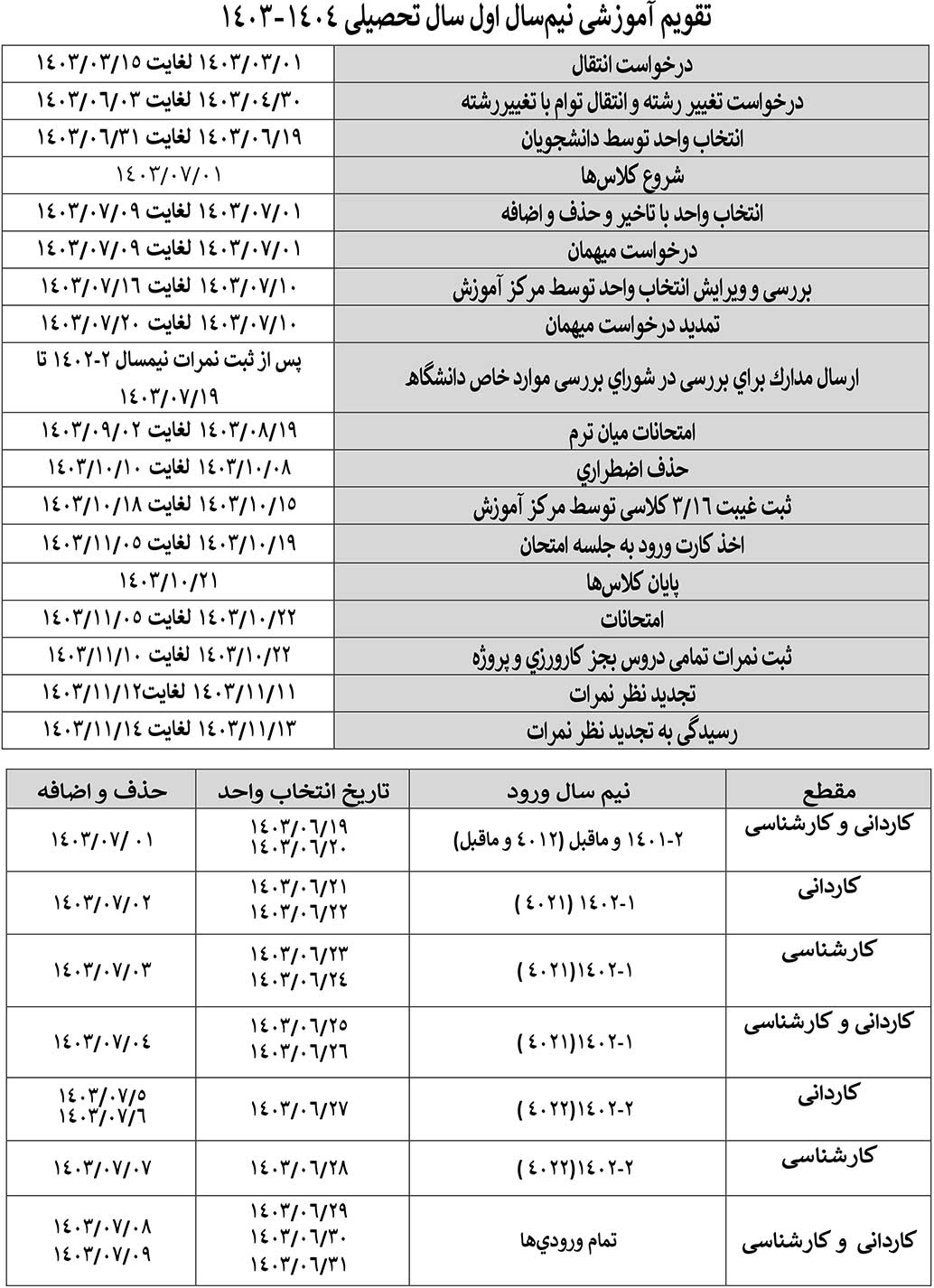

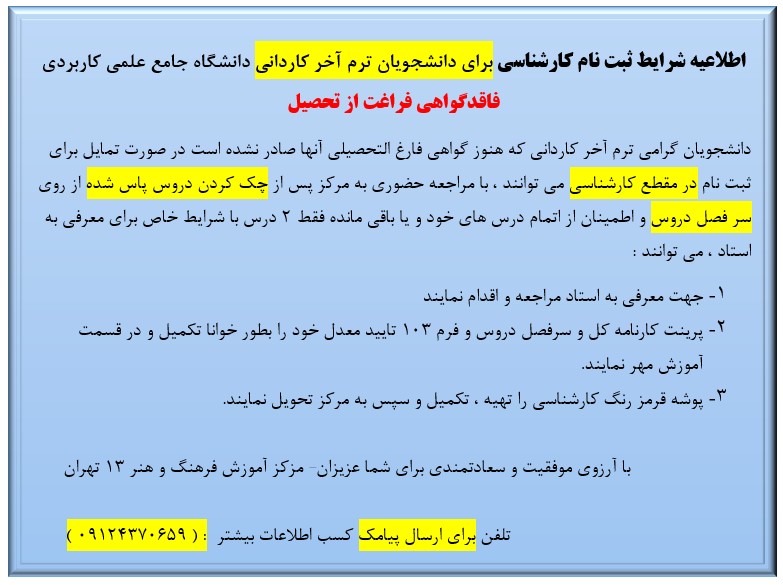
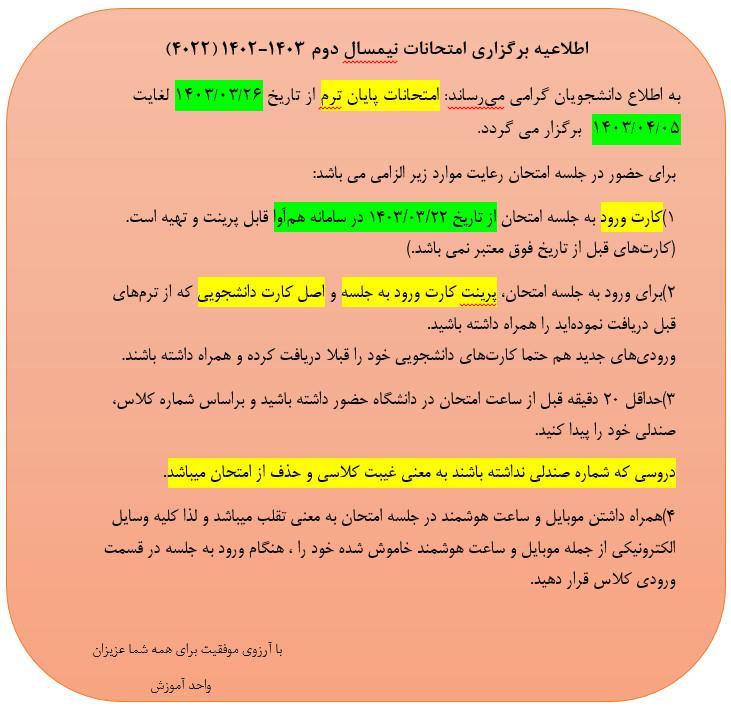
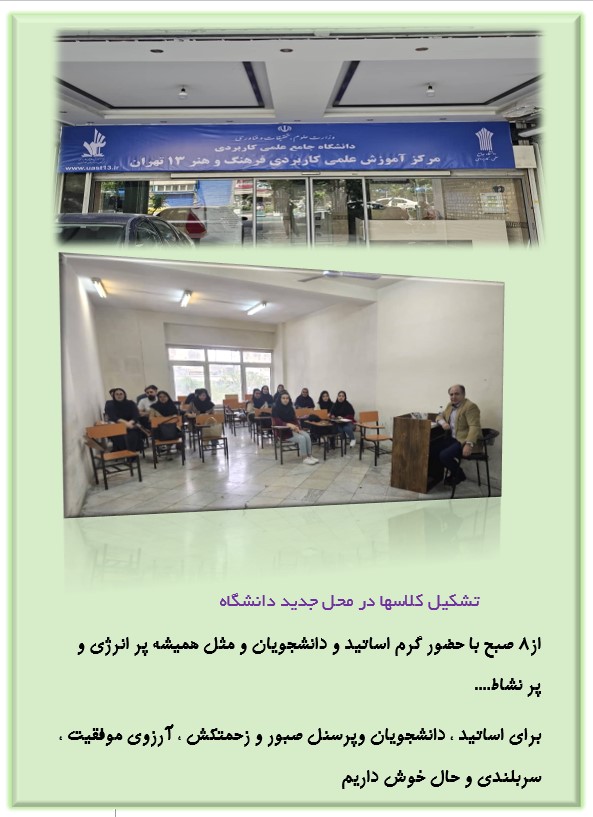
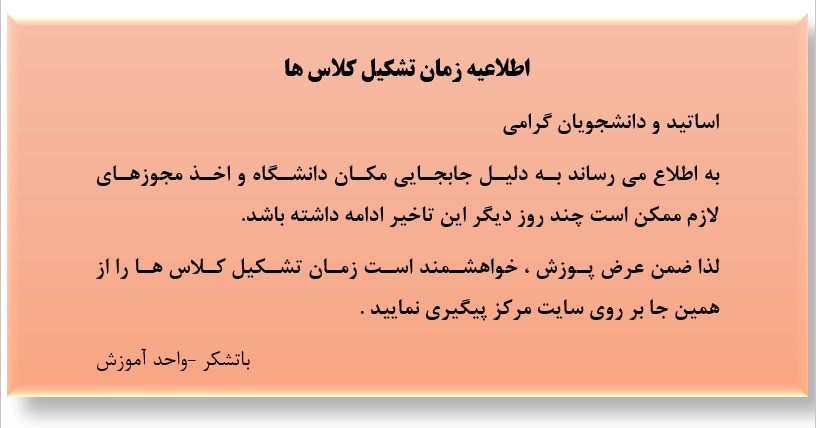
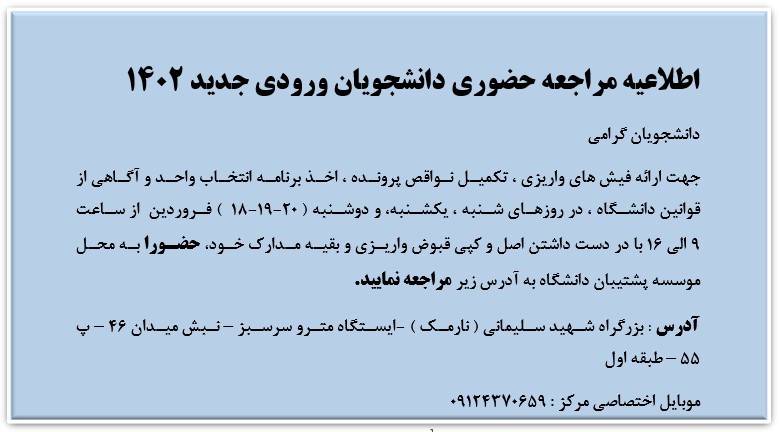
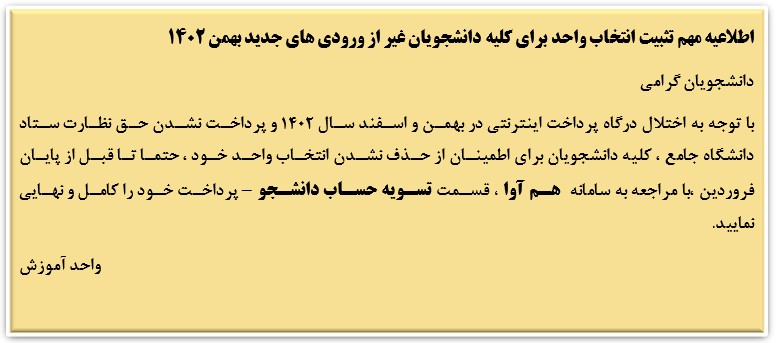
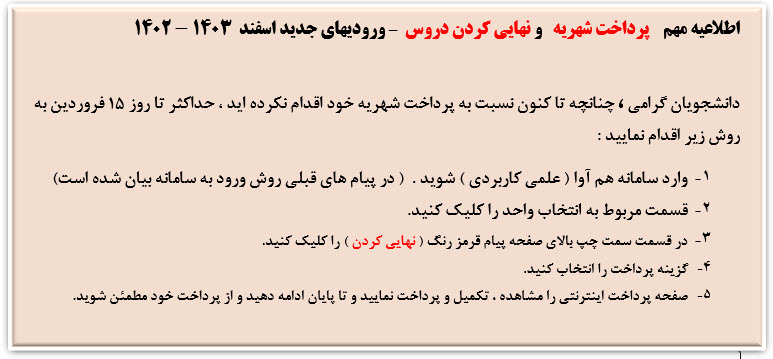
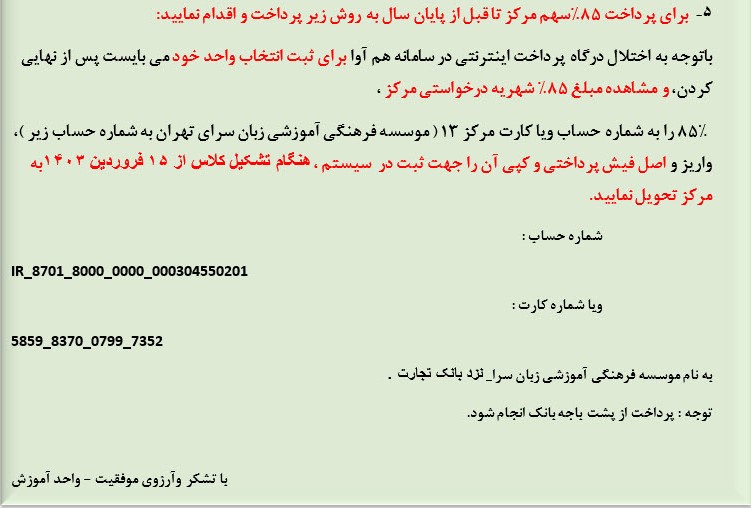
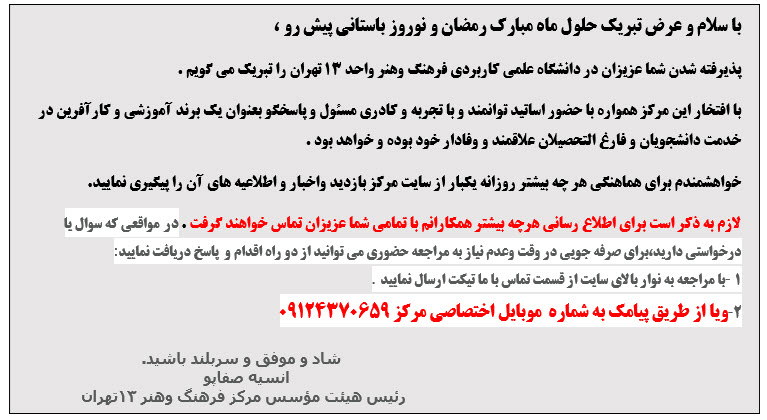
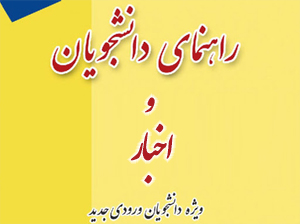





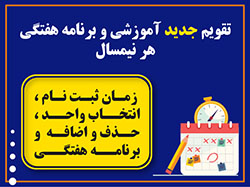












































نظرات